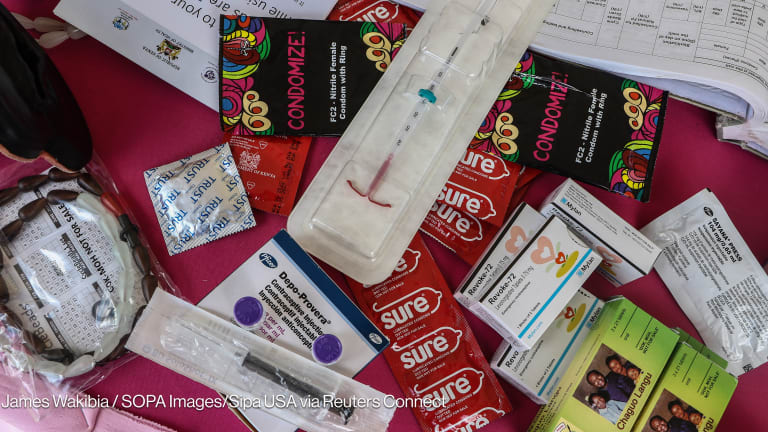
LONDON — A new campaign championing the benefits of combining family planning and conservation action — two sectors that have not seen eye to eye in the past — has been endorsed by more than 150 groups from both sides.
The Thriving Together campaign, officially launched Thursday to mark World Population Day, aims to drive support for the idea that improving access to family planning is not only good for women and girls — enabling them to space their children and prevent unwanted pregnancies — but can also be critical to biodiversity conservation efforts by taking pressure off local environments.
“Population pressure is still one of the biggest threats to biodiversity but it’s an issue which conservation groups are hesitant to talk about.”
— Janet Edmond, Conservation InternationalAn estimated 214 million women in lower-income countries want effective contraception but are currently unable to access it. Most of these women live in rural areas — cut off from health services — in countries that have large areas of untouched land, as well as iconic and endangered species.
This makes joint conservation, sustainable resource management, and family planning programming a win-win, according to David Johnson, CEO of the Margaret Pyke Trust, which is leading the campaign.
“The existence of barriers to family planning is the most important ignored environmental challenge of our day … When people can choose freely whether and when to have children it is for the benefit of both people and planet,” Johnson said.
International and national organizations from the worlds of reproductive health and population, including the United Nations Population Fund, Marie Stopes International and FP2020, as well as major conservation groups such as Greenpeace and Conservation International –– collectively spending $10 billion a year –– have put their names to a call to action. They are promising to work together on “strategic projects and policies [that] can help human communities and their ecosystems thrive,” while underscoring women’s choice about if and when to use contraception.
By working together, the groups can lower costs and have more impact, Johnson said.
How family planning can help save cheetahs
Conservationists and reproductive health actors may seem unlikely partners, yet two organizations have teamed up to publish a policy paper advocating for joint work on cheetah conservation and family planning.
Differences between the sectors’ activities and funders — as well as concerns about the association between some environmental thinkers and Malthusian ideas of “population control” — have traditionally kept them apart.
The campaign hopes to change that by creating a “new narrative” and “normalizing” the idea that access to family planning is a conservation issue, Johnson told Devex.
“We’ve got to stop saying that the problem is population … Barriers [to family planning] are the problem, not people,” he said.
Launched alongside a new background paper by the Margaret Pyke Trust, it marks a significant step forward for the fledgling field of integrated population, health, and environment — or PHE — programming in development.
While it has received some funding — mainly from the U.S. Agency for International Development and American philanthropists since the early 2000s –– it has largely been ignored by other donors.
However, the concept has resurfaced in recent years, including new proposals to combine family planning with sustainable livelihoods work to protect endangered cranes in west Uganda and boost cheetah conservation efforts in Namibia. Conservation NGO Blue Ventures has also been running PHE projects with coastal communities in Madagascar since 2007. Family planning NGO Pathfinder is also implementing PHE programs.
“Population pressure is still one of the biggest threats to biodiversity but it’s an issue which conservation groups are hesitant to talk about … and there’s a tendency to work in single sectors,” said Janet Edmond from Conservation International, which has integrated family planning into its programs in Madagascar, the Philippines, and Cambodia.
PHE advocates say these concerns are now fading and that more groups are embracing the need to work together. Edmond added that the conservation community increasingly recognized the need to “do a better job at respecting human rights.”
By offering combined community training on sustainable livelihoods alongside reproductive health, PHE advocates say their programs can deliver broader benefits, including on gender and empowerment.
Joint training mean PHE messages reach both men and women, helping men — who can be a barrier to women accessing contraception — better understand family planning. Similarly, involving women in sustainable farming can improve gender dynamics, according to Johnson.
Sandra Jordan, a senior advisor on rights and empowerment at FP2020 — a multi-stakeholder platform launched in 2012 to increase access to contraception — said the growing “energy” and advocacy around climate change means now is a good time to restart the conversation around PHE.
“With careful thought and programs, people can usually work out how to work with their environment while also maintaining their autonomy and reproductive rights and freedoms,” Jordan said.








